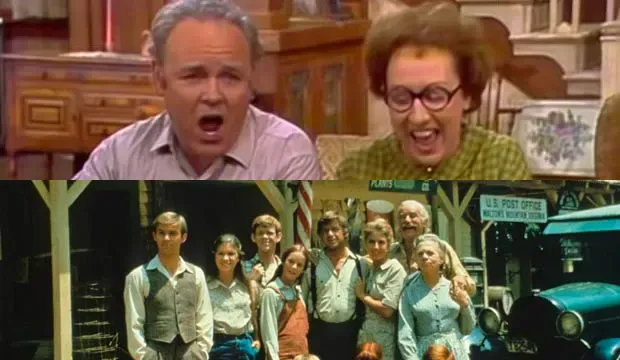
It was a night to remember at the 25th Primetime Emmys hosted by Johnny Carson on May 20, 1973. Three of the youngest Emmy winners ever received their statues, while a veteran director had a record year; it was also the last year Daytime Emmys were presented at the Primetime ceremony. It was a banner year for CBS, leading the pack with 64 major nominations; by comparison, ABC, NBC and PBS collectively had 73. CBS ended the night with 17 major wins, including most of the acting, writing and directing prizes. Their comedies dominated this era of television, with a now-classic winning its third consecutive title, and a new drama taking home more trophies than any other program. Read on for our Emmys flashback 50 years ago to 1973.
“All in the Family” became the first sitcom to take home Best Comedy Series three consecutive years, and also took the prize for Best Comedy Writing. The Best Comedy category was packed with sitcoms that are now considered classic, and all deserving of a win, including the “All in the Family” spinoff “Maude,” as well as “M*A*S*H” and “Sanford and Son.” The final contender failed to win in this category, but captured the Best Comedy Direction statue and nearly all of the acting categories.
“The Mary Tyler Moore Show” won three of the four acting categories for comedy, with multiple nominations in the supporting categories. Although she had won two lead awards previously for “The Dick Van Dyke Show,” Mary Tyler Moore had lost twice for her eponymous program. However, this year she finally took home the prize, her first of three for this series. She bested Jean Stapleton, who had won the two previous years for “All in the Family,” and Bea Arthur (“Maude”), who received her first of 11 career nominations; she would eventually win once for “Maude” and once for “Golden Girls.”
Moore’s costars Ted Knight and Valerie Harper won Best Supporting Actor and Actress, with Edward Asner and Cloris Leachman also nominated. “All in the Family” received Supporting Actor and Actress bids for Rob Reiner and Sally Struthers, and “M*A*S*H” received two Supporting Actor nominations, for Gary Burghoff and McLean Stevenson.
“M*A*S*H” and “All in the Family” also each received a nom in the Best Comedy Actor category, for Alan Alda and Carroll O’Connor, respectively. However, it was Jack Klugman who recaptured the title, having won in 1971 for his role as Oscar Madison in “The Odd Couple,” but having lost to O’Connor in 1972. Klugman also beat out the other half of “The Odd Couple,” Tony Randall; Alda would go on to win in 1974 and Randall would win in 1975. The only nominee in this category who never won an Emmy was Redd Foxx, who received his second out of three unsuccessful bids for “Sanford and Son.”
As with the comedy category, the nominees for Best Drama have gone on to become enduring classics. Police dramas and detective stories were popular at the time, so it’s no surprise that four of the nominees were from those genres — “Cannon,” “Columbo,” “Hawaii Five-O” and “Mannix” — while a fifth was an action adventure series — “Kung Fu.” However, it was a nostalgic series based on the recollections of a man raised in rural Virginia during the Depression and WWII that won the hearts of the Emmy voters and audiences alike. In its first season, “The Waltons” had the most major nominations (nine) and wins (five), including Best Drama, Best Writing (Drama) and three acting wins.
Richard Thomas was just a few weeks shy of his 22nd birthday when he won Best Drama Actor for playing John-Boy Walton, becoming the youngest nominee and winner in this category, a record which stands 50 years later. He won against four veterans, three of whom never won an Emmy for their popular roles: David Carradine (“Kung Fu”), Mike Connors (“Mannix”) and William Conrad (“Cannon”). Rounding out the category was the previous year’s recipient, Peter Falk, who would win three more times for his legendary portrayal of police detective “Columbo.”
Also winning for “The Waltons” was Michael Learned, who claimed Lead Actress for her role as the matriarch of the title family, and Ellen Corby, who won the Supporting Actress award for playing grandmother Esther Walton. “McMillan & Wife” also received bids in each of these categories, for Susan Saint James (lead) and Nancy Walker (supporting). Rounding out lead was Lynda Day George (“Mission: Impossible”), while Gail Fisher (“Mannix”) filled the final slot for supporting.
Besides Thomas, two other young actors earned Emmys that evening. The groundbreaking movie “That Certain Summer” was the first sympathetic portrayal of a same-sex couple broadcast on American television. For his portrayal as the son of one of the men, 16-year-old Scott Jacoby won Best Drama Supporting Actor, beating out James Brolin (“Marcus Welby, M.D.”) and Will Geer (“The Waltons”).